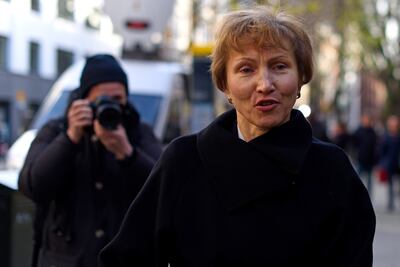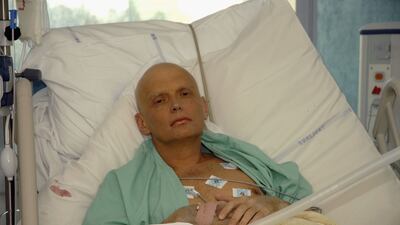Russia is responsible for the assassination of its former spy Alexander Litvinenko in London, the European Court of Human Rights has ruled.
The family of the former KGB agent have for years been pointing the finger of blame firmly at Russian President Vladimir Putin.
Litvinenko died after being poisoned with Polonium 210, an extremely potent radioactive isotope, in 2006.
Mr Putin has been suspected of signing off the killing, but the Kremlin has always denied involvement.
“Russia was responsible for the assassination of Alexander Litvinenko in the UK,” the Strasbourg-based court said.
But in Moscow, Putin's spokesman Dmitry Peskov rejected the claim.
He said: "There are still no results of this investigation, so making statements like these is at least unfounded... We are not prepared to accept this decision.”
Responding to a complaint brought by Litvinenko's widow Marina, the ECHR said it had established "beyond reasonable doubt" that the assassination had been carried out by Russians Andrei Lugovoi and Dmitry Kovtun.
Lugovoi, now a Russian MP, and businessman Kovtun were identified by British police as prime suspects after they both met Litvinenko at a central London hotel.
But attempts to extradite them have failed and they have both rejected the charges, with Lugovoi also claiming parliamentary immunity.

The court said there was a "strong prima facie" case that Lugovoi and Kovtun "had been acting on the direction or control of the Russian authorities".
Russia had not attempted to show in the case that the pair acted as part of a "rogue operation" and had also failed to rebut accusations of state involvement.
As a result, the court said it had decided the assassination was "imputable to Russia".
Litvinenko, 43, had been an outspoken critic of the Kremlin before he died after drinking a green tea laced with poison at London’s plush Millennium hotel.
Before dying, he issued a message blaming Mr Putin for the poisoning.
His death plunged Anglo-Russian relations to a post-Cold War low.
A lengthy British inquiry concluded in 2016 that Mr Putin probably approved a Russian intelligence operation to murder Litvinenko.
It also found that Lugovoy and Kovtun carried out the killing as part of an operation probably directed by Russia’s Federal Security Service (FSB), the main successor to the Soviet-era KGB.
The EU human rights court agreed. Both men have always denied involvement.
"The court found it established, beyond reasonable doubt, that the assassination had been carried out by Mr Lugovoy and Mr Kovtun," the court said.
"The planned and complex operation involving the procurement of a rare deadly poison, the travel arrangements for the pair, and repeated and sustained attempts to administer the poison indicated that Mr Litvinenko had been the target of the operation."
It too concluded that the Russian state was to blame and that had the men been carrying out a "rogue operation", Moscow would have the information to prove that theory.
But "the government had made no serious attempt to provide such information or to counter the findings of the UK authorities”.


